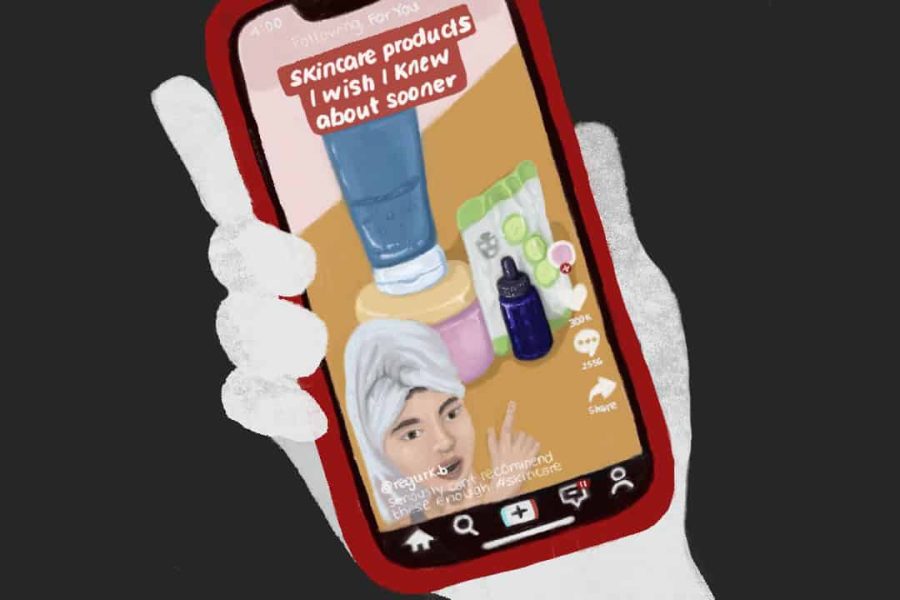Is it really worth the hype?
TikTok advertisements make a much bigger impact than we realize
May 26, 2023
TikTok is a haven for advertising of all sorts. Whether it be false advertising, influencers promoting products they got sponsored for, or normal people inserting their own opinions on products and providing their own takes on how well they work for them. It’s everywhere, and consumerism will only keep growing.
According to Social Pilot, consumer spending on TikTok has surpassed $2.5 billion globally, and that’s only the statistics from January 2023. Many friends and family members that you ask can attest to seeing a product on TikTok and buying it thinking that it would make their life easier. They get persuaded, by advertisers or influencers, that “their product is the best” and “it’s the cheapest thing on the market, but it works wonders”, etc.
Even average, everyday people who don’t have huge followings, suddenly go viral for talking about a product that was perfect for them, even if it’s over a lot of people’s budget. The main product that’s promoted by these people is makeup; almost directly targeting teenage girls and other individuals who use makeup.
The hashtag ‘beauty’ tag on TikTok has more than 88.2 billion views and counting, but the amount of makeup consumption poses a very real threat to the environment, according to Refinery29. Not only does it contribute to pollution and landfills, but it causes overproduction in the factories where the product is made, and the workers are worked even harder, without earning that much money from it.
Since 2015 more than 6.9 billion tons of plastic waste has been produced internationally and 79 percent ended up in landfills or nature, according to Attitude Living. Wildlife mainly suffers from the effects of landfill dumping and many animals end up eating the plastic, and then die later on; which leads to species becoming extinct.
Being environmentally conscious is one thing, but also knowing what is reliable and what’s not is just as important. Many Tik Tok videos will use enticing thumbnails or captions to grasp the viewers attention and convince them into buying the product. Such as “Items TikTok Made Me Buy”, “Skincare Products That Get Rid of Any Acne”, or even fashion tips like, “The Perfect Straight-Leg Jeans”, or “New Viral Miu Miu Glasses” and even more.
Sixty-eight percent of people that use TikTok find advertising content to be specifically unique or different from any competitive platform, according to Search Engine Journal. The uniqueness isn’t on purpose either; each individual users ‘For You Page’ is curated to show content that they continue to like and interact with. That includes advertisements, and the more curated advertisements an individual sees the more likely they are to go out and purchase whatever they’re advertising.
To put it simply, it’s all a big marketing scheme so businesses stay afloat and don’t lose revenue. Some businesses, though, are called ‘dropshippers’, which means that they don’t own a physical business and instead just sell the products online. Most of these dropshippers try to gain sympathy by guilt-tripping the viewers into thinking no one wants to buy their product.
In reality, though, the dropshippers just sell the product and rarely make any actual sales from it. Some advertisers just straight-up steal product ideas from larger companies and resell them for disgustingly cheap or grossly expensive prices. Websites such as Temu and Shein mass produce products that are commonly sold on other shopping sites, and even steal regular people’s artwork and make their own version of it.
Shein established itself in the United States and United Kingdom with its speed for producing fast-fashion items and making them very inexpensive, according to EqualOcean. They became a competitor for bigger companies and, since 2019, have made over $20 billion globally.
Fast-fashion and overconsumption is one of the leading causes of pollution in the world, and we can do our part by not being so influenced and trying to purchase more sustainable items. Obviously, sustainability can be expensive, but even pitching in a tiny bit by paying less attention to advertisements and shopping small businesses can be a small step in stopping consumerism.
Do it for the wildlife, the overworked and underpaid workers, and for yourself.


